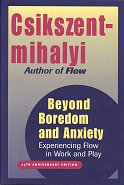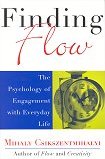This is the first of Csikszentmihalyi's books on flow, if not the first that I've read. This 25th anniversary edition, published in 2000, differs from the original in having an interesting retrospective preface, and some peculiar typographic effects due to the reproduction process (the text near the top of the pages exhibits disconcerting line by line changes in letter height, which took me right out of the flow of reading). It is rather more academic in style that some of the later popularisations: this helps give added depth and meat to the discussion, and you can just skip over the reported p-values and other statistical tests if you want to.
Csikszentmihalyi discusses four different flow activities: chess, rock climbing, "rock dancing" (freeform dancing to rock music), and surgery. Pulling out the commonalities and differences of these activities was what helped define the concept of flow, and its characteristics, in the first place.
In my earlier review of Finding Flow, I mentioned computer games as an obvious flow activity. This description is also a great characterisation of (current day) computer programming. It probably wasn't so close back in 1975, because of the batch-oriented nature of the task didn't give "clear and consistent feedback", or at least not until the following day. This would suggest that practices that increase the clarity, consistency (and immediacy) of the feedback could improve the flow experience -- such as the Test First or Test Driven Development approach advocated by agile methods such as Extreme Programming.
Although not discussed here, one flow activity mentioned in Finding Flow is driving. What is mentioned here is that flow activities are often constrained by quite strict rules (extremely so in chess, rather less so in rock dancing), which help define the activity, and focus the performance. I wonder if this could be (part of) the explanation for the weirdly extreme phenomenon of "road rage": that disproportionate response to a seemingly trivial action? Maybe it is because when someone breaks the relevant rules (those consensually agreed, if not always the legislated, Rules of the Road), they flip the driver out of the enjoyable and life-enhancing flow experience (or contribute to them not getting into it in the first place).
Explaining the title: boredom occurs when the task is too easy for the skills, and anxiety when it is too difficult. Where people can adjust the task (or their skills, for example, by handicapping themselves), they can enter the flow state, where there is a skill-task match. The final chapter, "Politics of Enjoyment", takes these ideas further, and discusses how more of our life, especially our work, might be enhanced by increasing the opportunities for flow. But there are downsides: the flow experience can be so enjoyable that some people get addicted, perpetually rock climbing, or doing surgery, to the neglect of all else. Yet if more activities in general were enjoyable in this way, maybe these people wouldn't be so likely to get addicted to the sole flow activity in their life?


